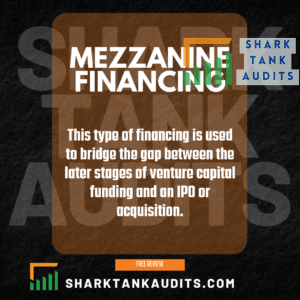Startup Funding Explained
Startup funding refers to the process of raising capital or financing for a new business venture. Startups typically require significant amounts of funding to cover their initial expenses, such as research and development, product design, marketing, and hiring staff. There are several different sources of startup funding, including:

- Bootstrapping: Self-funding a startup using personal savings, credit cards, or loans.

- Friends and Family: Borrowing money from friends and family members to fund a startup.

- Crowdfunding: Raising funds from a large number of individuals through a crowdfunding platform, typically in exchange for a product or equity stake.

- Angel Investors: High net-worth individuals who invest in early-stage startups in exchange for an equity stake.

- Venture Capital: Institutional investors who provide funding to startups in exchange for an equity stake.

- Accelerators and Incubators: Programs that provide funding, mentorship, and resources to startups in exchange for an equity stake.

- Grants and Government Programs: Government-funded programs that provide funding and support to startups in specific industries or locations.
The funding process typically involves creating a business plan, preparing financial projections, and pitching the business to potential investors. Investors will evaluate the startup’s potential for success, market opportunity, and management team before deciding whether to invest. The terms of the investment, such as the amount of funding and equity stake, will be negotiated between the startup and the investor. Startup funding can be a challenging and competitive process, but securing the right funding can help a startup grow and succeed in the long term.
Startup Funding Rounds
Startup funding rounds refer to the stages of financing that a new company goes through as it grows and develops. Each funding round is typically associated with a specific stage of a company’s development and is intended to provide the capital necessary to achieve specific milestones.
Here are some of the most common startup funding rounds:

- Pre-Seed: This is the earliest stage of funding, typically before a company has a functioning product or service. Pre-seed funding is often used to cover initial research and development costs, as well as to build a founding team.

- Seed: This is the first official funding round for many startups. Seed funding is used to develop and launch a product or service, and to build a team. Investors in this round may include angel investors, venture capitalists, or friends and family.

- Series A: This funding round is typically used to scale up operations and expand the company’s reach. Investors in this round may include venture capitalists, strategic investors, or private equity firms.

- Series B: This funding round is typically used to further scale the business and develop new products or services. Investors in this round may include venture capitalists, strategic investors, or private equity firms.

- Series C: This funding round is typically used to further scale the business and to prepare for an IPO or acquisition. Investors in this round may include venture capitalists, strategic investors, or private equity firms.

- Mezzanine Financing: This type of financing is used to bridge the gap between the later stages of venture capital funding and an IPO or acquisition. Mezzanine financing may include debt, equity, or hybrid securities.
The terms of each funding round will vary depending on the stage of development of the company, the market conditions, and the expectations of the investors. As a company progresses through each funding round, the amount of capital that it raises will typically increase, and the ownership stake of the founders and early investors will decrease as new investors come on board.
Raising Startup Funding
Raising startup funding can be a challenging process, but there are several steps that entrepreneurs can take to increase their chances of success:

- Develop a solid business plan: A well-crafted business plan that outlines your product or service, target market, financial projections, and growth strategy can help attract investors and secure funding.

- Identify potential investors: Research and identify potential investors who have experience in your industry or have invested in similar companies. These may include angel investors, venture capitalists, or crowdfunding platforms.

- Build a strong team: Investors want to see a strong and experienced team that can execute the business plan. Make sure to recruit team members with relevant experience and skills.

- Create a pitch deck: A pitch deck is a visual presentation that outlines your business plan, market opportunity, and financial projections. A compelling pitch deck can help to attract investors and secure funding.

- Network: Attend industry events, conferences, and pitch competitions to network with potential investors and build relationships.

- Be realistic about valuation: Set a realistic valuation for your company based on market conditions and financial projections. Overvaluing your company can deter investors and make it more difficult to secure funding.

- Be prepared for due diligence: Investors will conduct due diligence to assess the potential risks and opportunities of your business. Be prepared to provide financial statements, legal documents, and other information to investors.

- Be persistent: Raising startup funding can be a long and challenging process, but persistence is key. Don’t be discouraged by rejections and continue to refine your pitch and approach.
Overall, raising startup funding requires a combination of preparation, networking, and persistence. By taking these steps, entrepreneurs can increase their chances of attracting investors and securing the funding they need to grow their businesses.
Startup Funding Essential Terms

- Angel Investor: A high-net-worth individual who invests in startups in exchange for equity.

- Venture Capital: Institutional investors who provide funding to startups in exchange for an equity stake.

- Seed Funding: The initial round of funding that a startup receives to get off the ground.

- Series A Funding: The first major round of funding that a startup receives to help scale its operations.

- Series B Funding: The second round of funding that a startup receives to further scale the business.

- Series C Funding: The third round of funding that a startup receives to prepare for an IPO or acquisition.

- Pre-Seed Funding: Funding that a startup receives before it has a functional product or service.

- Mezzanine Financing: Financing is used to bridge the gap between later-stage venture capital funding and an IPO or acquisition.

- Convertible Note: A type of debt that converts into equity at a future date.

- Equity Financing: The process of selling ownership in a company in exchange for capital.

- Crowdfunding: Raising funds from a large number of individuals through a crowdfunding platform.

- Accelerator: A program that provides funding, mentorship, and resources to startups in exchange for equity.

- Incubator: A program that provides funding, mentorship, and resources to startups in exchange for equity.

- Private Equity: Investments made in private companies by institutional investors or high-net-worth individuals.

- Due Diligence: The process of conducting research and analysis to assess the potential risks and opportunities of a business.

- Pitch Deck: A visual presentation that outlines a startup’s business plan, market opportunity, and financial projections.

- Burn Rate: The rate at which a startup is spending its capital.

- Runway: The amount of time that a startup’s existing funding will last based on its current burn rate.

- Valuation: The estimated worth of a company based on its assets, revenue, and growth potential.

- Cap Table: A table that outlines the ownership and value of a company’s equity and debt securities.

- Exit Strategy: A plan for how investors will be able to sell their equity in a company and realize a return on their investment.

- Term Sheet: A document that outlines the terms of an investment, including the amount of funding, the valuation, and the rights and preferences of the investors.

- Dilution: The decrease in ownership percentage that existing shareholders experience when new shares of stock are issued.

- Liquidation Preference: The order in which investors will receive payouts in the event of a liquidation or sale of a company.

- Clawback Provision: A provision in an investment agreement that allows investors to recover some or all of their investment if certain conditions are not met.

- Equity Vesting: The process of earning ownership in a company over time based on continued employment.

- Option Pool: A pool of shares reserved for future employees and consultants.

- Pro Rata Rights: The right of existing investors to invest in future rounds of funding to maintain their ownership percentage.

- Participating Preferred Stock: A type of equity that allows investors to receive both a fixed dividend and a share of the remaining profits.

- Non-Dilutive Funding: Funding that does not require the issuance of new equity, such as grants or loans.

- Term Loan: A loan that is repaid over a fixed period with interest.

- Bridge Loan: A short-term loan that is used to bridge the gap between two funding rounds.

- Working Capital: The capital that a company uses to cover its day-to-day expenses.

- Financial Projections: Forecasts of a company’s future revenue, expenses, and profits.

- Strategic Investor: An investor who provides capital in exchange for a strategic partnership or access to technology, markets, or resources.

- Family and Friends: The initial round of funding that a startup receives from friends, family members, or acquaintances.

- Public Offering: The process of offering shares of stock to the public for the first time.

- Initial Coin Offering (ICO): A type of crowdfunding that uses cryptocurrencies to fund projects.

- Security Token Offering (STO): A type of crowdfunding that uses digital tokens to represent ownership in a company or asset.

- Secondary Market: A market where shares of privately held companies can be bought and sold.

- Lead Investor: The primary investor in a funding round who sets the terms and conditions for other investors.

- Co-Investor: An investor who participates in a funding round alongside the lead investor.

- Due Diligence Checklist: A list of questions and criteria that investors use to evaluate a potential investment.

- Capitalization Table (Cap Table) Management: The process of maintaining and updating a company’s cap table to reflect changes in ownership and value.

- EBITDA: Earnings before interest, taxes, depreciation, and amortization, a measure of a company’s financial performance.

- Exit Multiple: The ratio of the exit value of a company to its earnings or revenue.

- Pre-Money Valuation: The estimated value of a company before a new round of funding is received.

- Post-Money Valuation: The estimated value of a company after a new round of funding is received.

- Non-Disclosure Agreement (NDA): An agreement that prohibits parties from disclosing confidential information.



Startup Funding Explained